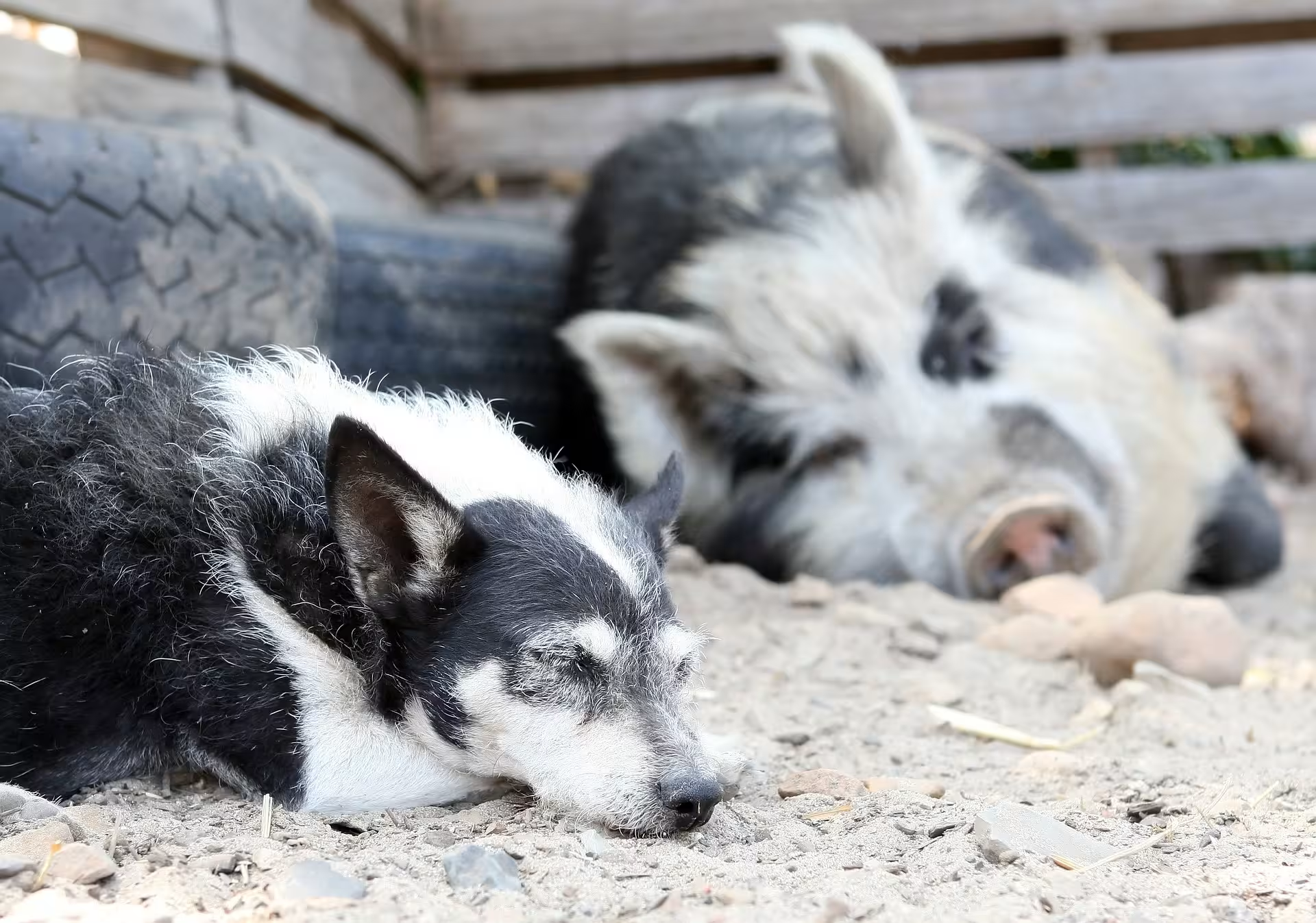A Beloved YA Fantasy Series Gave Me Hope for an Animal-Friendly Future





Tamora Pierce's Immortals quartet contains surprising insights about how humans can learn and grow in their views of animals raised for food.

Recently, ill in bed for a week with a grim flu, I followed a decades-long habit of comfort reading and reached for a quartet of YA fantasy novels about a girl who can talk to animals. Listen—when you’re sick, you do what you’ve gotta do.
Actually, I’m not embarrassed at all about my comfort reading. Written by Tamora Pierce and published between 1992-1996, the Immortals quartet stands the test of time. In Pierce’s funny, evocative prose, the four books tell the story of Daine, who rises from poverty and obscurity to fight alongside knights, mages, and kings in Pierce’s epic imagined land of Tortall. Pierce has written over twenty books set in this universe, which began in 1983 with the story of a girl who disguised herself as a boy in order to train as a knight. In the forty years since, Pierce has enthralled thousands of readers with her enchanting novels, in which feminism is matter-of-fact and politics are curious and nuanced. I loved them as a 12 year old, and I still love them today. Every time I read them, even in the fog of illness or heartbreak, I find something new.
On this read, what struck me over and over was Daine’s relationship with animals, and, in particular, eating animals. This might seem both obvious and contradictory: Daine, the heroine of the Immortals quartet, has ‘wild magic’. Over the series, she gains a range of new abilities: the ability to speak to animals, to inhabit their minds, and ultimately, to transform into an animal herself. At the same time, the novels’ medieval-esque universe has an era-typical approach to eating and hunting animals, pragmatic and unquestioned. There are no factory farms in Tortall, of course. But there are no vegetarians, either.
All the same, the Immortals quartet offers not just a version of ethical eating in a medieval fantasy world, but a fascinating sense of the evolution of someone’s views toward eating animals. What makes the Immortals quartet so individual and important is the sense of potential growth, and the understanding of how empathy and learning work together to change our perspective of our eating habits.
Daine is always loving and caring toward animals, even before she learns how to speak to them. But she is also explicitly a meat-eater, even when other characters in the novel question it, thinking that “because she shared a bond with animals… she ought to go meatless.” Daine’s response is amusingly direct: “That’s fair daft… Some of my best friends are hunters.” (She’s talking about her wolf buddies.) “I’m a hunter. You eat what you’re made to eat.”
But even this cheerful declaration for eating meat is immediately followed by an ethical qualification: “I just make sure I don’t use my power to bring game to me, and I stop listening for animal voices with my magic… Otherwise my hunting would be—dirty. Vile…. I hunt like any other two-legger, looking for tracks and following trails. And… I kill fast and clean, so my game doesn’t suffer.”
It’s a lesson about humane treatment that many modern day practices blithely ignore. Still, this ethical and informed approach to eating meat is perhaps nothing new in the realms of cool fantasy heroines. What sets Daine apart is the way she grows and changes in response to her new experiences with animals. The conversation quoted above occurs in the second book of the series. By the third, Daine’s food choices have further qualifications:
‘I learned how to shape-shift a year ago. My first mistake was when I thought I’d try deer shape, one day last winter. See, I didn’t know the royal huntsmen would be out, looking for some game—’
‘I think I can see where this is going… So you can’t eat deer—’
‘Last spring we were rounding up killer unicorns, and bandits cornered me. I’d gotten separated from Numair and panicked. I changed into a wild goose.’ Remembering, she sighed.
‘Big mistake?’ There was sympathy in his voice.
‘They got me with a barbed arrow. I escaped, but almost lost the arm. Anyway, ever since I could take on a creature’s mind or shape, I can’t eat game of any kind. I eat fish, and domestic meat like beef and chicken, but then, I never wanted to be a fish, and I close out the thoughts of barnyard animals. I’m sorry. I used to hunt and eat game with the best of them, but not anymore.’
Later in the same book, Daine—a friendly and cheerful heroine, who tends to get along with most people—risks offense to her royal hosts by turning down a meat course of antelope steaks: “Daine swallowed hard. She had managed skewers of roast duck and peppers, smoked salmon and herring, and tarts filled with cheese and ham. She had even tried snails in garlic butter. At the risk of giving offense, she could not eat this. Worse, she knew Kaddar was bound by social custom to eat only the things she did. ‘I’m sorry,’ she whispered. ‘I can’t.’”
As these quotes make visible, Daine is far from a vegetarian. She is not a perfect character (thankfully, as they tend to be deeply boring to read about) and she is certainly not a perfect vegan. She harbors a very mean antipathy toward poor chickens, judging them stupid. If only she knew: actually, chickens have the ability to count, show foresight, build close bonds, and recognize over 100 individual faces.
Similarly, her line about “closing her thoughts” to "barnyard animals" is uncomfortably close to the way too many people think about the food on their plates. The ‘uncomfortable’ fact that billions of animals suffer in order to provide us with a meal is something that many people choose to ignore in order to enjoy their meals. Like Daine, we’re often happy to consider some animals—dogs, horses—as companions, while we consciously block out the real agency, emotions, and lives of other animals, like chickens or cows.
But in Daine’s defense, she is also operating in a world where vegetarianism as a result of horror about the way farmed animals are treated doesn’t make sense; in Tortall, chickens, ducks, pigs, cows, and fish aren’t subject to the inhumane processes that bring them to our dinner plates today. And what I love about Daine is the way she allows her experience to shape and change her; she isn’t afraid to decide that she was wrong and adapt her eating habits as such.
Her evolution is shaped by empathy. Daine loves animals, and she is changed by them, alert to non-human ways of seeing the world. This comes through in fascinating glimpses, some imagined and some rooted in Pierce’s in-depth research into the world of animals. At one point in the first novel, Daine asks some bats to tell her how many enemy knights are close by, and has to translate their answer: “Bats tended to count by the way they roosted: their idea of numbers was flexible, and depended on the breed of bat. Daine knew she couldn’t tell the baron or the Riders [that] her friends had seen six quarter-colonies.” Later in the novel, an animal’s perspective comments on Daine’s “atrocious accent.” Daine is at once deeply intimate and deeply alien to and with the animals, but she never loses her sense of their complex lives and emotions. They might not be human, but to Daine, they are people. And in fact, over the series, that is how she ends up referring to them, the same way she discovers animals refer to themselves: as the People.
There’s something to learn here, something that touched a chord in my heart as a child reader and still resonates with me as an adult. Tamora Pierce’s novels gave animals a voice and just one person who could access that voice. By restricting the ‘wild magic’ powers to Daine, Pierce makes this world recognizable to us. Like Daine’s friends, we can’t speak to animals, let alone transform into them. But like in Daine’s world, the animals that surround us have real emotions, lives, relationships, dynamics, jokes, sorrows. Just because we can’t speak to them doesn’t mean they’re not there.
It’s okay that it takes us time to realize this. And unlike Daine, we don’t have the empathetic trump card of literally being hunted to realize how horrifying it must be. We have to make an imaginative leap, and to recognize that our idle cravings for meat can not and must not be answered by the vast scale of animal suffering in the industry.
In the final novel of the series (mild spoilers!), Daine meets her father, the source of her wild magic, and discovers that he’s literally the god of the hunt. He’s disappointed in her eating choices:
‘What kind of hunter’s daughter won’t touch game?’
Daine sighed. ‘One that’s been hunted… I’m down to mutton, chicken, and fish, Da. I’m just too close to the rest of the People to be eating them.’
I like to think that Daine’s evolution continues as she grows, that she finds more empathy and common ground with those sheep, chicken, and fish; the build of the series makes it seem likely. But what’s more important is the empathy the novels highlight as all-important to understanding our place on the planet. Daine’s kindness, her bravery, her consideration, her respect are all-important because they pertain to humans and animals. In fact, she is a heroine because of this connection with animals, and because she fights for the rights of all her friends, human and non-human. The message of Wild Magic is that we cannot be heroes unless we see animals as fellow people of our planet, and not products for our table.





